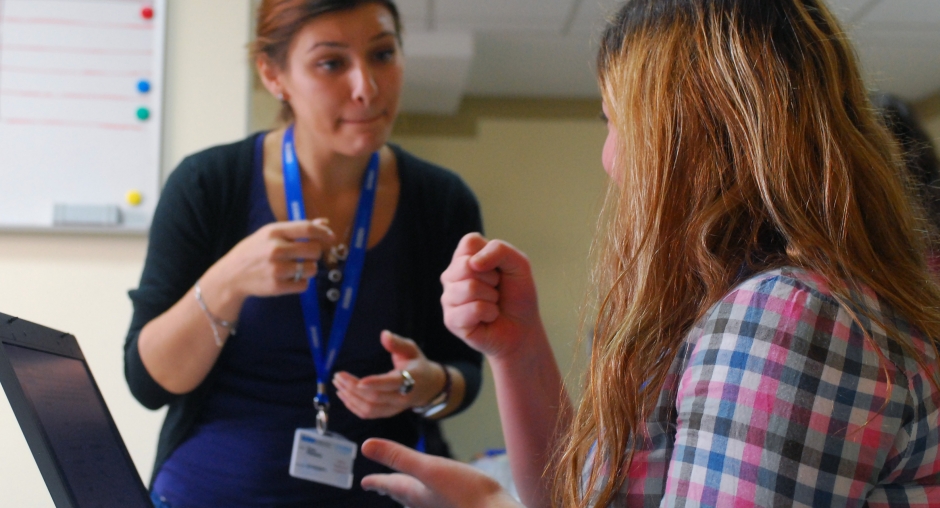
Two young women discuss the challenges and triumphs in their educational and professional careers, exposing the exclusion and discrimination faced by many people living with disabilities in Bosnia and Herzegovina.
Thanks to her ability to read lips, Melita Ćano managed to graduate from university despite the number of challenges she faced throughout her university career.
“The communication between me and those around me was lacking. Of course, there were exceptions. Two professors, in particular, were always ready to help me,” says Ćano, who is hearing impaired.
She explains that she was not surprised by the difficulties that arose when she tried to communicate with other students. “Most people are not familiar with the difficulties we encounter, nor with our methods of communication.”
“While I was waiting for a class, a girl approached me and asked me a question I didn’t understand. When I told her I can’t hear, she pityingly said: ‘Oh, okay, sorry.’ and she left,” recounts Ćano.
Despite all the difficulties she faced during her time at university, she graduated from the Department of Social Work at the Faculty of Political Sciences in Sarajevo.
Anela Talam-Crnovršanin, who is also hearing impaired, graduated from the Faculty of Special Education and Rehabilitation in Tuzla, majoring in surdoaudiology. She chose the degree due to her own disability and her desire to help people with the same condition. “During my studies, I had great peers who helped me, and professors who were very understanding about my situation. As for following lectures, it was difficult. I always had to sit in the first row. I couldn’t always follow everything, so I would stay after class for additional explanations,” she says.
After graduating from university, Ćano and Talam-Crnovršanin are now facing the same problem – finding adequate employment.
“Employers are prejudiced against people with hearing impairments. I am currently unemployed. I am also not receiving any compensation from the Employment Agency even though, according to the law, I could be,” says Talam-Crnovršanin.
Ćano managed to find a job, but not in the field she studied. “I know it’s difficult, but I will not give up on my goal,” she says.
Unlike Ćano and Talam-Crnovršanin, many people with disabilities don’t have access to high-quality education. Although schools are making efforts toward inclusivity, there has not yet been major progress. Teachers often cannot devote enough time to students with disabilities, so schools hire special assistants who, at times, do not have adequate experience.
Oftentimes, disabled students cannot keep up with their peers and, thus, are not ready for the demands of the job market. Further, employers are often not willing to help them overcome any ongoing problems that arose during their education.
Jasminka Proho from the Association for the Hearing Impaired of Canton Sarajevo explains that, in order to overcome these problems, the state should implement the UN Convention on the Rights of Persons with Disabilities, according to which the state has a duty to ensure a quality education.
“Through quality education, persons with disabilities will have the best chance to show what they are capable of. This system will give us a young person who is able to meet the demands of the job market and find employment without any problems,” says Proho.
Ćano also stresses that more government support is needed. She says: “They should try to understand us and give us a chance.”
The Fund for Professional Rehabilitation and Employment of Persons with Disabilities of the Federation of BiH was a source of hope for many persons with disabilities. However, the Fund did not live up to the expectations as it “does not work on sustainable employment in business entities”. An often-cited example is that companies that get financial incentives for hiring persons with disabilities fire them as soon as they spend the incentive money. The Fund for Professional Rehabilitation and Employment of Persons with Disabilities does not fine such companies.
While there remains much to be done in terms of ensuring equal opportunities for people with disabilities in Bosnia and Herzegovina, people like Ćano and Talam-Crnovršanin provide examples of what can be achieved with perseverance and external support systems.
This publication has been selected as part of the 2018 Srđan Aleksić Youth Competition, a regional storytelling competition that challenges youth to actively engage with their own communities to discover, document, and share stories of moral courage, interethnic cooperation, and positive social change. The competition is a primary component of the Post-Conflict Research Center’s award-winning Ordinary Heroes Peacebuilding Program, which utilizes international stories of rescuer behavior and moral courage to promote interethnic understanding and peace among the citizens of the Western Balkans. The final winners of the 2018 competition will be announced in the coming months.
Support for this program has been graciously provided by the National Endowment for Democracy (NED).






